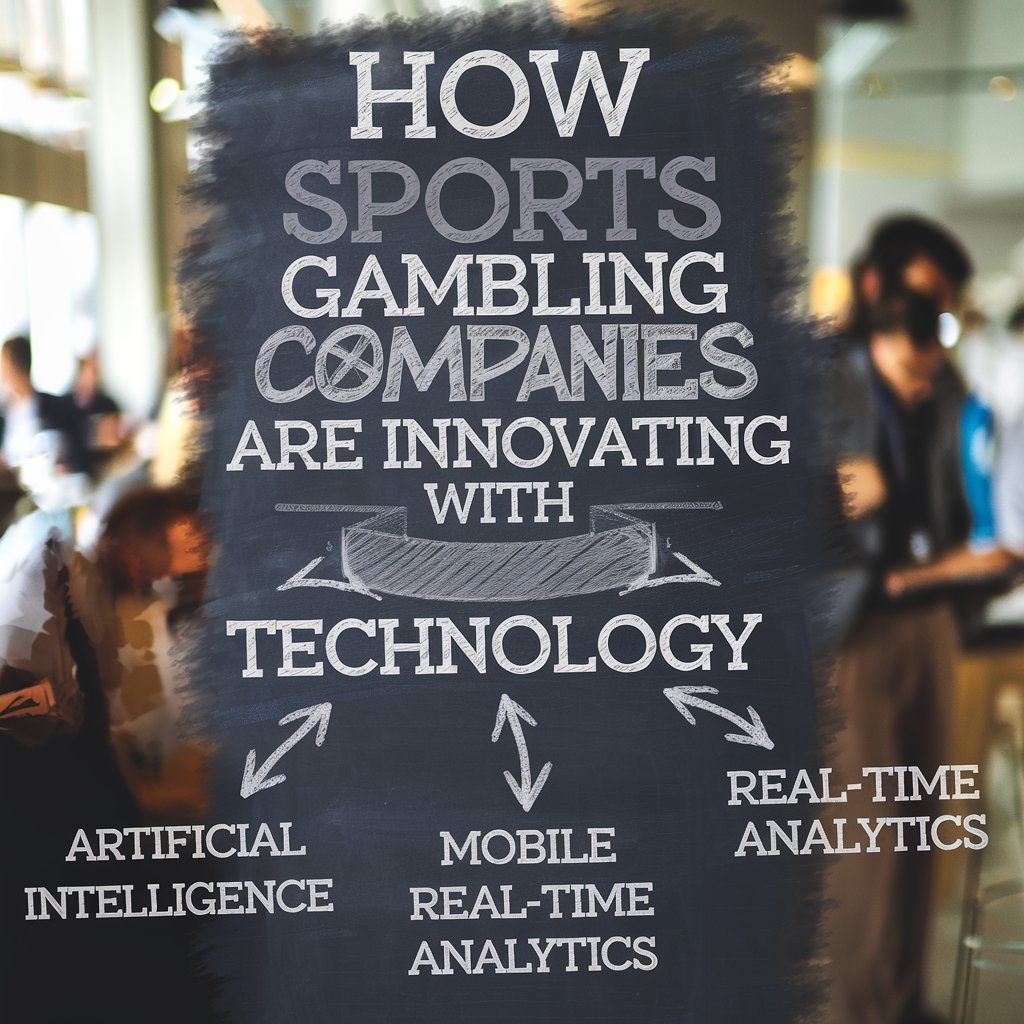The world of sports betting is undergoing a technological revolution. Sports gambling companies are leveraging cutting-edge innovations to enhance user experience, improve operational efficiency, and stay ahead in a competitive market.
This article explores the various ways gambling companies are using technology to transform the industry.
The Technological Landscape of Sports Betting
Before we get into specific innovations, let’s consider the current technological context of the sports betting industry.
Digital Transformation
- Shift from traditional brick-and-mortar betting shops to online platforms
- Rise of mobile betting apps
- Integration of sports betting with other forms of online entertainment
Regulatory Changes
- Legalization of sports betting in various jurisdictions
- Need for technology to ensure compliance with diverse regulations
Changing Consumer Expectations
- Demand for seamless, user-friendly betting experiences
- Expectation of real-time data and instant gratification
Key Technological Innovations in Sports Gambling
Let’s explore some of the most significant ways sports gambling companies are leveraging technology.
1. Artificial Intelligence and Machine Learning
AI and ML are revolutionizing how gambling companies operate and interact with users.
Personalized User Experiences
- AI-driven recommendation systems for bets and content
- Customized odds based on user behavior and preferences
Fraud Detection and Prevention
- Machine learning algorithms to identify suspicious betting patterns
- Real-time monitoring of user accounts for potential fraud
Automated Customer Service
- AI-powered chatbots for instant customer support
- Natural language processing for more human-like interactions
2. Blockchain and Cryptocurrency
Blockchain technology is bringing transparency and efficiency to sports betting.
Secure and Transparent Transactions
- Blockchain-based betting platforms for increased trust
- Smart contracts for automated and transparent payouts
Cryptocurrency Integration
- Acceptance of Bitcoin and other cryptocurrencies for bets
- Development of betting-specific tokens and coins
Decentralized Betting Platforms
- Peer-to-peer betting networks without centralized control
- Reduced fees and increased privacy for users
3. Virtual and Augmented Reality
VR and AR are creating immersive betting experiences.
Virtual Sports Betting
- AI-generated virtual sports events for continuous betting opportunities
- Realistic simulations of real-world sports
Enhanced Live Betting
- AR overlays for real-time stats during live sports events
- VR experiences that put bettors “in the stadium”
Interactive Betting Interfaces
- VR-based virtual betting shops
- Gesture-controlled AR betting interfaces
4. Big Data and Analytics
Sports gambling companies are harnessing the power of data to gain insights and improve operations.
Advanced Odds Calculation
- Real-time data analysis for more accurate odds-setting
- Integration of vast historical datasets for predictive modeling
User Behavior Analysis
- Deep dives into betting patterns and preferences
- Tailored marketing and retention strategies based on data insights
Performance Optimization
- Data-driven decisions for platform improvements
- A/B testing of new features and interfaces
5. Mobile Technology
Mobile platforms are at the forefront of innovation in sports betting.
App-Based Betting
- Feature-rich mobile apps for on-the-go betting
- Push notifications for personalized alerts and offers
Geolocation Services
- Location-based compliance with local betting laws
- Targeted promotions based on user location
Mobile Payment Integration
- Seamless integration with digital wallets and payment apps
- Biometric authentication for secure transactions
6. Internet of Things (IoT)
IoT devices are creating new data sources and betting opportunities.
Wearable Technology Integration
- Data from athletes’ wearable devices influencing odds
- Fan engagement through connected devices in stadiums
Smart Home Betting
- Voice-activated betting through smart home assistants
- Integration with smart TVs for synchronized betting and viewing
IoT-Enabled Sports Equipment
- Data from connected sports equipment informing prop bets
- Real-time performance metrics influencing in-play betting
The Impact of Technology on User Experience
These technological innovations are significantly enhancing users’ betting experience.
Convenience and Accessibility
- Ability to place bets anytime, anywhere via mobile devices
- Easier access to a wide range of betting markets
Enhanced Engagement
- Interactive features that make betting more engaging
- Real-time updates and live streaming keep users connected to the action
Improved Trust and Transparency
- Blockchain-based systems provide verifiable fairness
- Open access to detailed statistics and historical data
Personalization
- Tailored recommendations and content based on individual preferences
- Customized odds and promotions for each user
Challenges and Considerations
While technology offers numerous benefits, it also presents challenges for sports gambling companies.
Regulatory Compliance
- Keeping up with varying regulations across different jurisdictions
- Implementing robust age and identity verification systems
Data Security and Privacy
- Protecting sensitive user data from breaches
- Balancing personalization with user privacy concerns
Responsible Gambling
- Using technology to promote responsible betting behavior
- Implementing effective self-exclusion and limit-setting tools
Technology Adoption and Integration
- Keeping pace with rapid technological advancements
- Integrating new technologies with existing systems
The Future of Technology in Sports Gambling
Looking ahead, we can anticipate several trends in how gambling companies will continue to innovate.
Artificial Intelligence Advancements
- More sophisticated AI for personalized risk management
- AI-driven virtual sports commentators and analysts
5G and Edge Computing
- Ultra-low latency for real-time betting and streaming
- Enhanced mobile betting experiences with 5G capabilities
Quantum Computing
- Potential for ultra-complex odds calculations
- Enhanced encryption for ultimate data security
Biometric Authentication
- Facial recognition and fingerprint scanning for secure logins
- Voice recognition for seamless betting commands
Expanded Use of AR and VR
- Fully immersive VR betting environments
- AR integrations at live sporting events for on-site betting
Case Studies: Innovation in Action
Let’s look at how some leading sports gambling companies are implementing these technologies.
Company A: AI-Driven Personalization
- Implemented machine learning algorithms for personalized bet suggestions
- Saw a 30% increase in user engagement and a 15% boost in retention rates
Company B: Blockchain Integration
- Launched a blockchain-based betting platform for transparency
- Reduced transaction fees by 50% and increased user trust metrics
Company C: VR Sports Simulation
- Developed VR-based virtual sports with real-time betting
- Attracted a new demographic of tech-savvy users and increased off-season engagement
Conclusion
The intersection of technology and sports betting is creating an exciting and rapidly evolving industry. Sports gambling companies are at the forefront of adopting and adapting new technologies to enhance user experiences, improve operational efficiency, and stay competitive in a growing market.
From AI and blockchain to VR and IoT, these technological innovations are not just changing how bets are placed, but also how sports themselves are experienced and interacted with.
The future promises even more integration between sports, technology, and betting, potentially blurring the lines between spectator, bettor, and participant.






